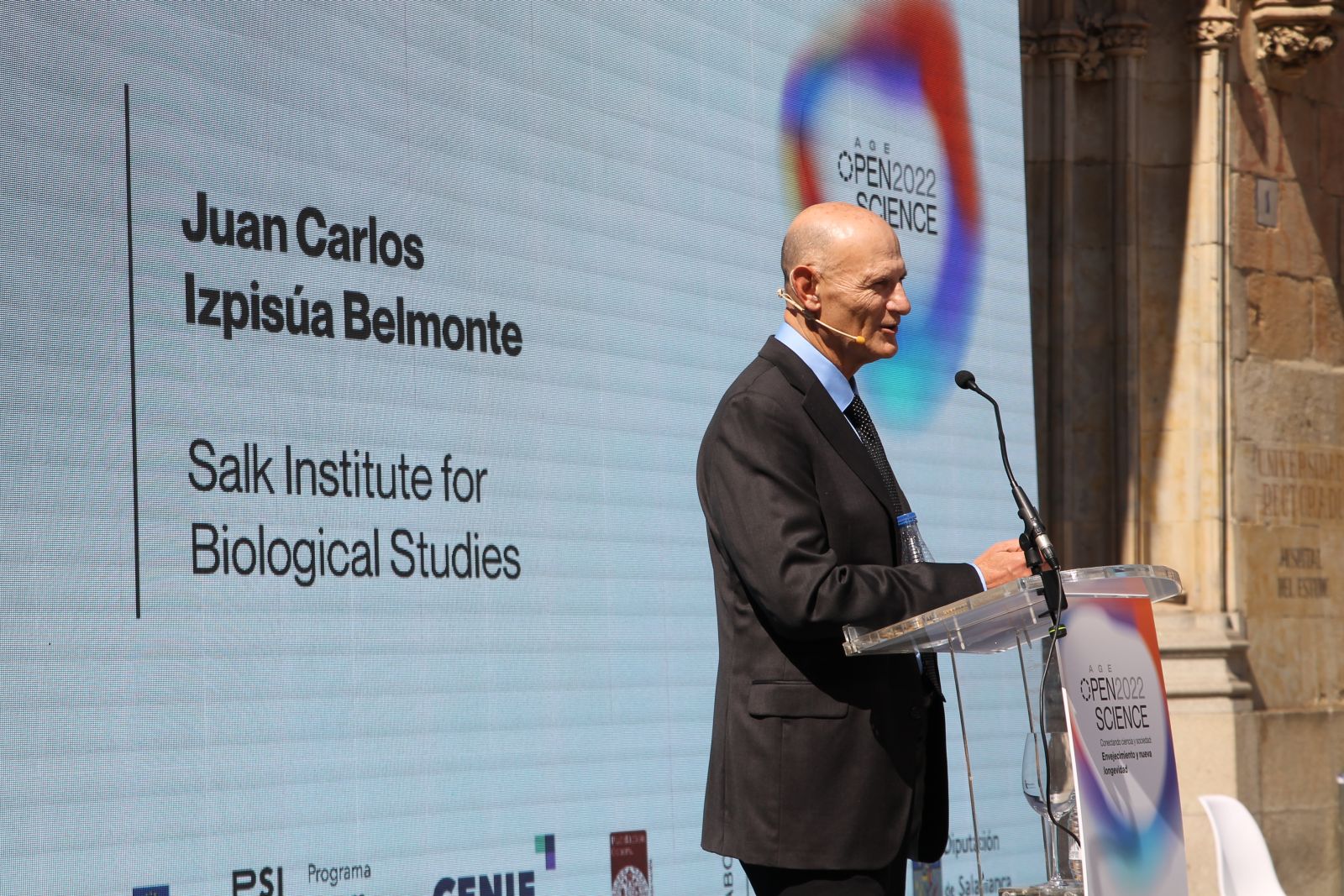The first edition of Age Open Science comes to an end in Salamanca
The first edition of the scientific forum Age Open Science closed today at the Colegio Arzobispo Fonseca in Salamanca. During the 11th and 12th of May, scientists and researchers at the forefront of ageing and longevity studies filled the streets of Salamanca to bring science closer to society. They held meetings and generated debates throughout the city, in a tour of the most emblematic places in the city of Salamanca such as the Palacio de Anaya, the Palacio de Monterrey, the Patio de Escuelas and the Paraninfo of the University of Salamanca, the courtyard of the Palacio de la Salina of the Salamanca Provincial Council, the Patio Chico and the Cloister of the Colegio Arzobispo Fonseca.
Juan Carlos Izpisúa, co-organiser of Age Open Science and the first to speak in the streets of Salamanca, stressed in his speech that "with our studies in the laboratories we have managed to rejuvenate cells and control diseases, which means living better. It's not about living longer, it's about living better.
Pura Muñoz, who addressed the issue of cellular senescence, acknowledged that "we are not going to be immortal, but I am convinced that with all the improvements we are seeing, we will live better and better. I believe that children who are born now and have good genetics will be able to live more than 100 years.
In the Cloister of the Palacio de Anaya, the scientist Giovanna Mallucci presented her most recent studies, which show that "neurodegenerative diseases will be the main cause of death in developed countries by 2040".
Manuel Serrano stressed the importance of investing in research to reverse ageing and to focus efforts on the facts that show that "as we get older, the immune system is no longer effective".
US scientist Thomas Rando, who works at Stanford University's Center on Longevity, said that "the latest research clearly shows that diet and exercise have a clear effect and are very helpful in the process of cell rejuvenation".
Robin Franklin spoke about regenerative biology and reversing the ravages of time, reflecting on "the importance of working and striving to change the concept of age for that of functionality, both for cells and for people, since that is what rejuvenation is all about".
Professor Kun Zhang presented his latest research and highlighted the importance of technology as "maximising the resources offered by technology, which is the focus of my work, is fundamental to the successful development of ageing research. We have recently applied technologies directly to organs, such as mapping the human brain, the most sophisticated organ in humans.
Biologist Vera Gorbunova, who is working on the search for the mechanisms of longevity, noted that "we are currently testing cell modifications that control cancer in mice in the laboratory. The success of this research could soon be applied to humans.
In the Plaza de las Agustinas of the Palacio de Monterrey, Cynthia Kenyon gave her speech on biological clocks, where she stressed that "ageing is something universal in all living beings, but the speed of ageing is different in all of them, including human beings. When I started studying ageing in the 1990s, we thought that there were no genes that influenced ageing, and today, now that all this theory has changed, we are getting closer and closer to being able to modify them to delay ageing. We need to keep working towards this.
Heinrich Jasper, director of Genentech Inc. and professor at the Buck Institute for Research on Aging, reiterated the importance of "understanding homeostasis and identifying ways to intervene to extend people's quality of life".
Researcher Steve Horvath, in his presentation on DNA methylation studies of ageing in different mammals, explained how the biological clocks that he himself has developed work, highlighting that "DNA methylation makes it possible to construct biomarkers that can be applied throughout a lifetime".
CNIO's Scientific Director, María Blasco, was in charge of speaking at the last Age Open Science meeting at the Cloister of the Archbishop Fonseca College in Salamanca. In her speech, she highlighted the importance of events like this to promote the development of concepts such as rejuvenation or longevity, and presented her most recent research where "we have managed to extend the quality of life of mice through telomerase, thus delaying ageing. We hope that one day it will be applicable to humans.
The event was part of the Programme for a long-lived society project approved within the framework of the INTERREG V-A Programme, Spain-Portugal, POCTEP, 2014-2020, of the European Regional Development Fund (ERDF) and has had the collaboration of the City Council and the Provincial Council of Salamanca.
On the occasion of the XXXII Spanish-Portuguese Summit in October 2021, the Governments of Spain and Portugal undertook, among other issues, to cooperate closely to address scientific challenges, among others; therefore, Age Open Science, which is born with a vocation of permanence, aspires to hold its next edition in Portugal.






